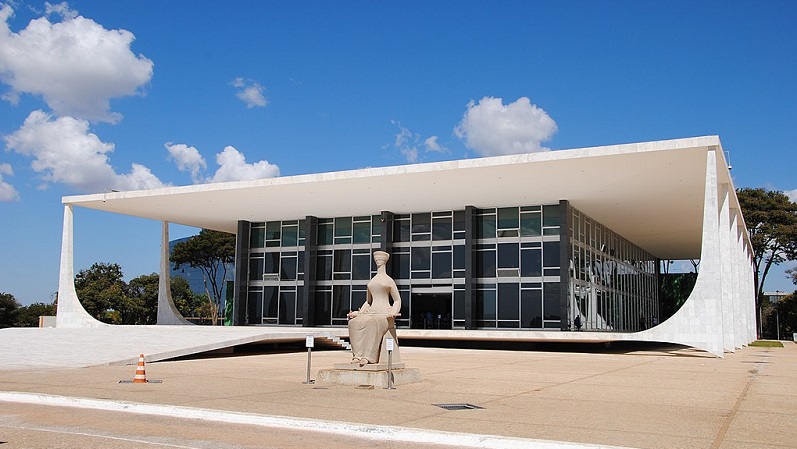Climate campaigners are taking the Brazilian government to the Supreme Court, arguing its deforestation record breaches constitutional protections for the Amazon and future generations as well as international commitments.
The environmentalists are seeking a court order on the government to reduce deforestation by 60% in 2021, in line with the national policy on climate change. If this target is missed, campaigners say deforestation should stop completely for a year.
In 2019, the Brazilian government abandoned its main anti-deforestation plan, known as PPCDAm. In the same year, president Jair Bolsonaro’s first full year in office, there was a 34% increase in deforestation.
The NGOs bringing the case argue that the scrapping of PPCDAm breached the Brazilian constitution. Article 225 states “all have the right to an ecologically balanced environment” and says the government has a duty to “defend and preserve it for present and future generations”.
Bolsonaro shifts blame for unprecedented Brazilian wetland fires
They also argue deforestation breaches Brazil’s international commitments. Greenpeace Brazil’s climate and justice co-ordinator Fabiana Alves said: “Even under a totally unambitious contribution to the international Paris Agreement, Brazil is now lacking public policy, budget and staffing to guarantee the application of our national laws. We need to stop this free fall.”
Caio Borges is the coordinator of the Instituto Clima e Sociedade’s legal programme. He told Climate Home he is aware of six ongoing legal cases against the government’s deforestation policies in the last six months. Four of these are in the Supreme Court and two are in lower courts. “They complement each other in many aspects and have some overlaps,” he said.
In this case, Borges said he expects the court to rule “that there is a systemic failure by the government to fulfill its constitutional duties and obligations on the protection of the right to a healthy environment and that a major risk posed by such omission is the exacerbation of climate change impacts on vulnerable groups, the protected biomes and biodiversity”.
What the Supreme Court will order the government to do though is an open question, Borges said. “If a systematic violation of constitutionally protected rights is found, then the court could step in to correct the state failure, ordering things such as the development of action plans to curb deforestation, compulsory allocation of resources to equip the agencies and to replenish climate funds.”
Landless Brazilians are invading more and more protected areas of the Amazon
Caroline Prolo, head of the environmental law practice at the Brazilian law firm Stocche Forbes, said that this was the first time the Supreme Court has been asked to address alleged violations of Brazil’s national climate change policy which incorporates its legally binding commitments to UN Climate Change (UNFCCC).
“If successful,” she said, “it will open an avenue for other claims of climate inaction by the federal government. If the Supreme Court recognizes that the UNFCCC´s principles are transposed and may give rise to concrete obligations under Brazilian domestic law, this could help building a legal argument around the existence of a fundamental human right for a stable climate system within Brazilian law, which could in turn make the basis for many other climate litigation cases in the country.”
The court case has been formally lodged by six opposition political parties, with the backing of 10 NGOs including Greenpeace, the Climate Observatory and the indigenous peoples’ organisation APIB. A decision on precautionary measures is expected in 2021, but the final ruling could take several years to emerge.
Environmentalists urge UN to condemn Brazil’s spying at climate talks
Climate litigation is becoming increasingly common across the world. The London-based Grantham Institute logs 412 climate lawsuits in its database, not including the US.
Norway’s Supreme Court is deliberating on calls for the Norwegian government to stop Arctic oil licenses under both the national constitution and the Paris Agreement. In April 2018, the Colombian Supreme Court ruled in favour of 25 young people and ordered the government to ensure the protection of the Amazon from deforestation to protect present and future generations.
